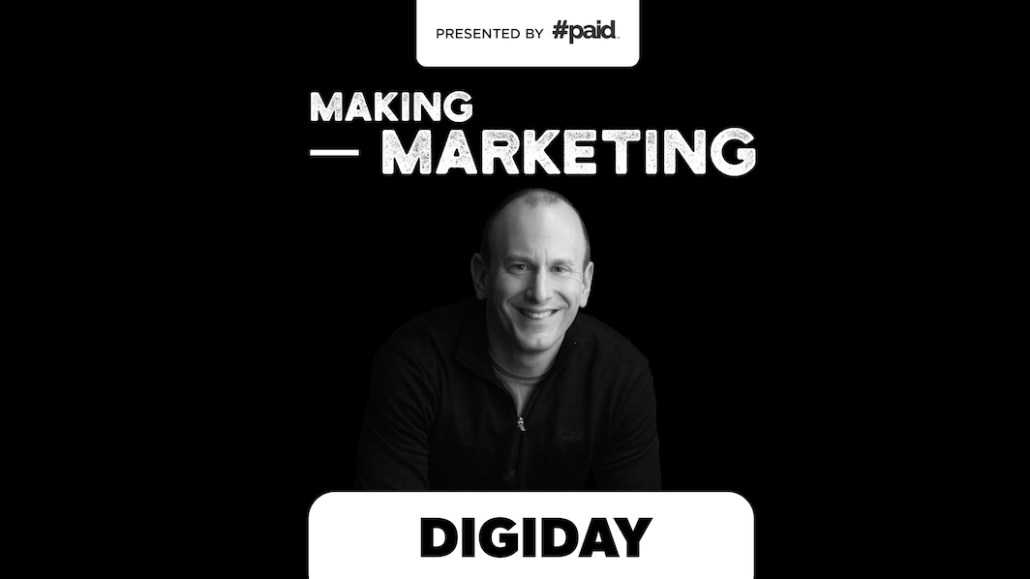Save 50% on a 3-month Digiday+ membership. Ends Dec 5.
Audible CMO John Harrobin: The broken windows theory of customer experience is myopic

Subscribe: iTunes | Google Play | Stitcher | RSS | Anchor
Amazon doesn’t just dominate the market for paperbacks and e-books. Through its subsidiary Audible, it has the audiobook market (worth $2.1 billion, according to Bloomberg) cornered, too.
It’s also not limiting themselves to putting existing books on tape. “We want to give our customers experience beyond traditional audiobooks,” said Audible CMO John Harrobin. The company’s range of audio products — like Audible-exclusive books and listenable stories from The New York Times — means that “competition is anything that you can do when your eyes are occupied but when your mind is free.”
Many of Audible’s subscribed listeners consume 80% of its content in just one format, whether e-book, print or audio. “But several people are choosing to listen to certain types of content via audio,” said Harrobin. “For example, many people that are e-book readers listen to non-fiction on audio, because they do it in their commutes. It’s not that escape moment for them where they’re relaxing and reading.”
On this week’s episode of Making Marketing, Harrobin talked about how the company serves as both a platform and a creator of original content, the reason brands are so bent on selling “purpose” and a serendipitously-named Kentucky Derby contender.
Here are a few highlights from the conversation, lightly edited for clarity.
Ad position: web_incontent_pos1
Don’t sweat (just) the small stuff
“There’s so much buzz right now about customer experience and ‘the broken windows’ theory of customer experience: ‘If we just fix the little things, everything will come together magically.’ And I don’t dismiss the value in fixing the little things and the fact that one plus one could equal three. I believe that. But I believe myopically focusing on that is analogous to cost-cutting your way into growth. It just is illogical. It doesn’t scale and it doesn’t work. So while we have efforts to do that, we really focus on customers that love us. Our most passionate, engaged, enthusiastic customers. What are they doing that others aren’t?”
Why brands are selling “purpose”
“I believe that initially, marketing was very brand-focused, where you had a brand set of values and promises that you made to customers. Then, with the advent of the digital age, people started optimizing funnels and converting, and that’s very empirical, very quantitative. It’s like left brain meets right brain. And I think, go back about 10 years, there’s almost this tension between each side. And I believe that the reconciliation of that has resulted in purpose as a unifier between the brand marketers that speak to the heart and the empirical conversion marketer that speak to the head. That enables them to come together on one common mission.”
A horse by any other name
“Audible’s got OK brand awareness but not exception brand awareness. It’s a newer category. So we benefit from any cultural moment that we can latch onto. And this horse called Audible popped up in everybody’s Google feed as a potential Kentucky Derby winner. So I actually called the horse farm. And we sponsored the horse, and we got all this great exposure. All these great people came out and talked about how they’re rooting for Audible, and say what they’re listening to on Audible. We had no idea that it was going to get such traction. We thought it was relevant, fun, authentic. And we just leaned into it.”
More in Marketing

Ulta, Best Buy and Adidas dominate AI holiday shopping mentions
The brands that are seeing the biggest boost from this shift in consumer behavior are some of the biggest retailers.

U.K. retailer Boots leads brand efforts to invest in ad creative’s data layer
For media dollars to make an impact, brands need ad creative that actually hits. More CMOs are investing in pre- and post-flight measurement.
Ad position: web_bfu